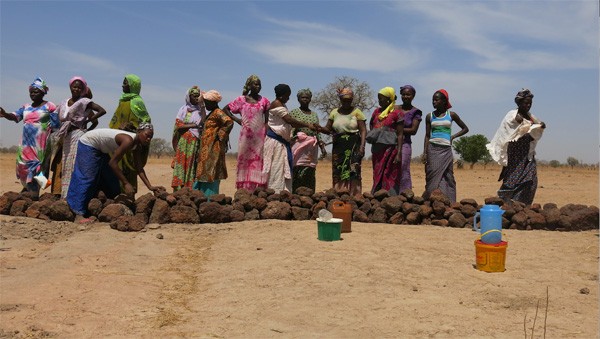
The fortunes of farmers throughout Africa go up and down based on the presence or absence of one thing: rain.
Sub-Saharan Africa is one of the most vulnerable regions to climate change in the world. Because more than 96 percent of cultivated land in sub-Saharan Africa is rainfed rather than irrigated, extreme climate events like droughts and floods pose a severe threat to food security and nutrition. UN projections show that by 2020, yields from rainfed agriculture in some African countries could be slashed in half due to climate change.
Farmers are feeling the pinch. In Kalbiron, Senegal, Binta Ndao and her husband earn a good living growing millet, groundnuts, cowpeas, and sesame on their two hectares of land. But this livelihood depends on steady rainfall. “Sometimes there is rain but it is not well distributed,” said Binta. At these times, she said she feared she would be unable to feed her seven children.
But Binta’s income is becoming more reliable even as rainfall becomes more erratic due to the R4 Rural Resilience Initiative, a program that works to improve the ability of food insecure farmers who rely on rainfed agriculture to withstand increasingly frequent and intense climate shocks. The initiative began in Ethiopia in 2011, as a strategic partnership between the World Food Programme (WFP) and Oxfam America. It built upon the success of HARITA (Horn of Africa Risk Transfer for Adaptation), an integrated risk management framework developed by Oxfam America, the Relief Society of Tigray (REST), Ethiopian farmers, and other national and global partners. In 2012, USAID and WFP provided funding for the program to expand to Senegal, where it is building the capacity of governments to manage climate risks and giving farmers the financial and agricultural tools to thrive in the face of unpredictable climate events.
Building a Safety Net
“R4 uses a comprehensive risk management approach to achieve its goals,” said Fabio Bedini, WFP’s Senior Program Advisor for R4. “The program takes into account each country’s and region’s specific needs and potential.”
Central to this approach is building a safety net for farmers. Insurance is a key component of this safety net. R4 has introduced new insurance plans that allow poor farmers to trade their labor for weather-index insurance. It also works with the Columbia University International Research Institute for Climate Society to train the national insurance company and larger insurance community on how best to provide this type of insurance. When droughts or other natural disasters occur, these farmers are compensated for their losses. For smallholders, this makes a tremendous difference. A project evaluation showed that the insured farmers save more than twice as much as uninsured farmers, invest more in productive assets, and have up to triple the grain reserves of uninsured farmers. These farmers are expected to eventually graduate to paying for this insurance with cash.
R4 also helps farmers form village savings groups in which they pool their savings so they can invest together, take care of emergency needs, and access small loans. Savings and credit access enable farmers to purchase tools to grow their businesses, respond better to emergencies, and diversify their livelihoods.
The program boosts resilience by helping farmers adopt more climate-sensitive production methods. Using a watershed approach, R4 shows farmers how to make the most of increasingly variable natural resources.
In Senegal, R4 focuses primarily on rehabilitating low-lying lands for rice cultivation. By removing sand and constructing reinforced stone bunds, farmers there have been able to limit erosion. In addition, the construction of small dams and embankments has helped prevent run off and improve soil moisture. These interventions have not only boosted rice productivity, but they have also improved groundwater recharge, which has led to increased water levels in village wells and improved productivity of mango trees.
Ensuring Long-Term Resilience
As R4 battles the impacts of climate change in Africa, it makes sure to take a far-sighted approach. After all, the regional climate will remain volatile long after the program ends and R4 wants farmers to have the tools they need for the long run. “We strive to make the program sustainable at every step,” said Mr. Bedini. “Community-based participatory planning and education and training ensure community engagement and contribute to the program’s longevity over time.”
R4 has reached more than 26,000 farmers in Ethiopia and Senegal and is currently in the process of expanding to Malawi and Zambia. These farmers have a newfound sense of security. One of them, mother-of-four Zemada Kebeb, said that R4’s financial and natural resource management initiatives have transformed her village. “We have more water, we planted more trees, and we have less heat than before,” she said. “Now, we have no fear.”
C. Zeilberger







Comment
Make a general inquiry or suggest an improvement.